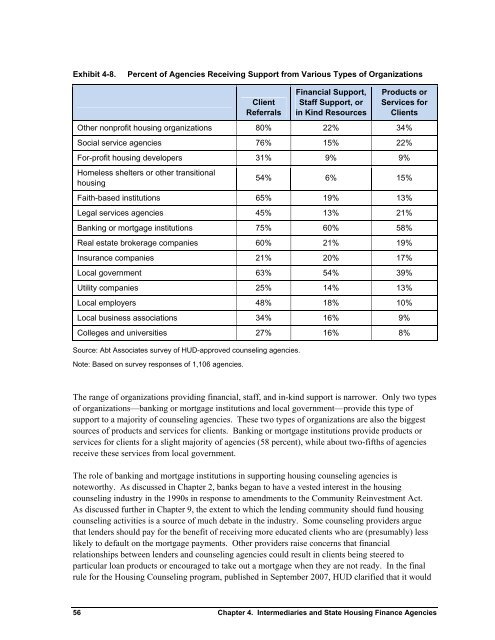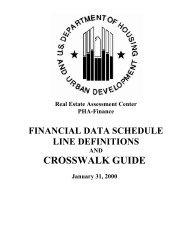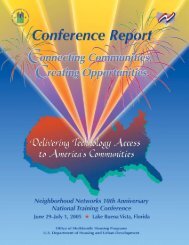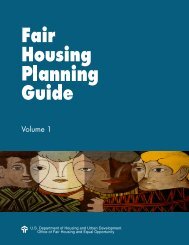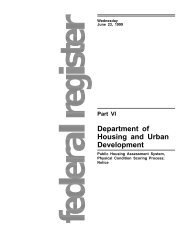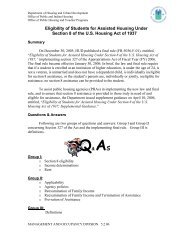Housing Counseling Process Evaluation and Design of ... - HUD User
Housing Counseling Process Evaluation and Design of ... - HUD User
Housing Counseling Process Evaluation and Design of ... - HUD User
You also want an ePaper? Increase the reach of your titles
YUMPU automatically turns print PDFs into web optimized ePapers that Google loves.
Exhibit 4-8.<br />
Percent <strong>of</strong> Agencies Receiving Support from Various Types <strong>of</strong> Organizations<br />
Client<br />
Referrals<br />
Financial Support,<br />
Staff Support, or<br />
in Kind Resources<br />
Products or<br />
Services for<br />
Clients<br />
Other nonpr<strong>of</strong>it housing organizations<br />
80%<br />
22%<br />
34%<br />
Social service agencies<br />
76%<br />
15%<br />
22%<br />
For-pr<strong>of</strong>it housing developers<br />
31%<br />
9%<br />
9%<br />
Homeless shelters or other transitional<br />
housing<br />
54%<br />
6%<br />
15%<br />
Faith-based institutions<br />
65%<br />
19%<br />
13%<br />
Legal services agencies<br />
45%<br />
13%<br />
21%<br />
Banking or mortgage institutions<br />
75%<br />
60%<br />
58%<br />
Real estate brokerage companies<br />
60%<br />
21%<br />
19%<br />
Insurance companies<br />
21%<br />
20%<br />
17%<br />
Local government<br />
63%<br />
54%<br />
39%<br />
Utility companies<br />
25%<br />
14%<br />
13%<br />
Local employers<br />
48%<br />
18%<br />
10%<br />
Local business associations<br />
34%<br />
16%<br />
9%<br />
Colleges <strong>and</strong> universities<br />
27%<br />
16%<br />
8%<br />
Source: Abt Associates survey <strong>of</strong> <strong>HUD</strong>-approved counseling agencies.<br />
Note: Based on survey responses <strong>of</strong> 1,106 agencies.<br />
The range <strong>of</strong> organizations providing financial, staff, <strong>and</strong> in-kind support is narrower. Only two types<br />
<strong>of</strong> organizations—banking or mortgage institutions <strong>and</strong> local government—provide this type <strong>of</strong><br />
support to a majority <strong>of</strong> counseling agencies. These two types <strong>of</strong> organizations are also the biggest<br />
sources <strong>of</strong> products <strong>and</strong> services for clients. Banking or mortgage institutions provide products or<br />
services for clients for a slight majority <strong>of</strong> agencies (58 percent), while about two-fifths <strong>of</strong> agencies<br />
receive these services from local government.<br />
The role <strong>of</strong> banking <strong>and</strong> mortgage institutions in supporting housing counseling agencies is<br />
noteworthy. As discussed in Chapter 2, banks began to have a vested interest in the housing<br />
counseling industry in the 1990s in response to amendments to the Community Reinvestment Act.<br />
As discussed further in Chapter 9, the extent to which the lending community should fund housing<br />
counseling activities is a source <strong>of</strong> much debate in the industry. Some counseling providers argue<br />
that lenders should pay for the benefit <strong>of</strong> receiving more educated clients who are (presumably) less<br />
likely to default on the mortgage payments. Other providers raise concerns that financial<br />
relationships between lenders <strong>and</strong> counseling agencies could result in clients being steered to<br />
particular loan products or encouraged to take out a mortgage when they are not ready. In the final<br />
rule for the <strong>Housing</strong> <strong>Counseling</strong> program, published in September 2007, <strong>HUD</strong> clarified that it would<br />
56<br />
Chapter 4. Intermediaries <strong>and</strong> State <strong>Housing</strong> Finance Agencies


